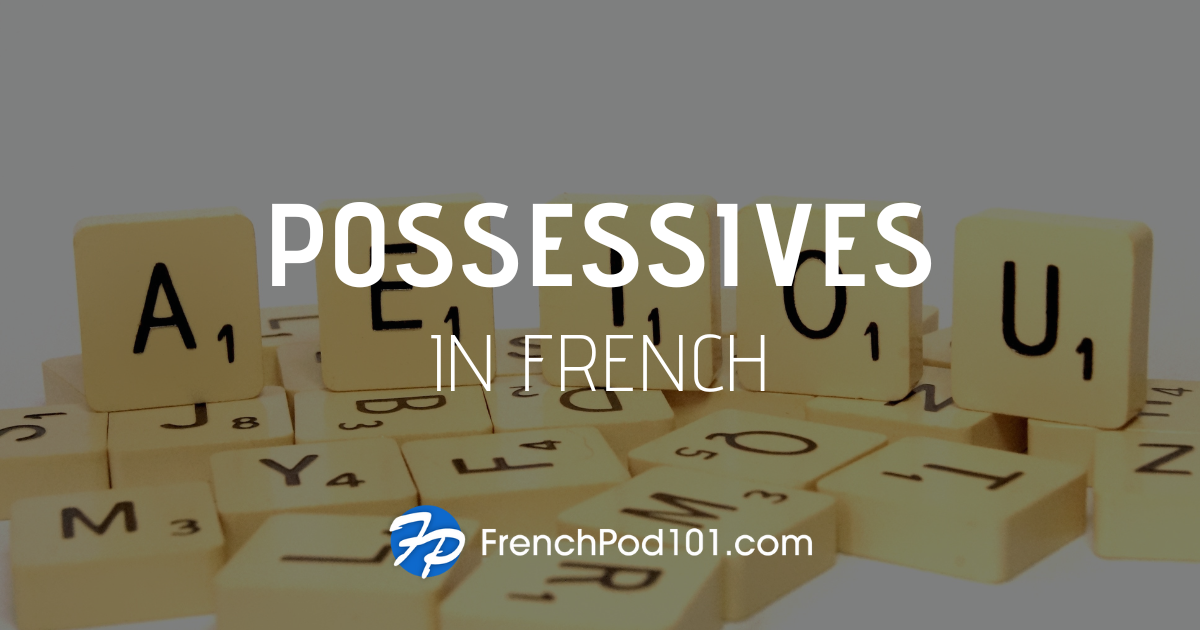
Do you feel like your French is awkwardly congested with unnecessary repetitions? Wish there was a way to make these go away, and replace them with…let me think…beautiful pronouns? Oh, hey, what a coincidence!
French pronouns are what keep you from repeating the same things over and over when it’s already been mentioned, or when it’s just plain obvious. For example, you wouldn’t call your friends by their names in every single sentence. It’s better to use personal pronouns, such as tu, il, or elle. And this is just the tip of the iceberg.
In this article, we’ll talk about the ten main categories of French pronouns—direct and indirect object pronouns all the way to the relative pronouns.
There’s a lot of French pronouns rules to process and a hefty load of vocabulary, so spend as much time as you need to read the examples or to practice making sentences on your own, and you’ll be a pronouns expert before you know it. =)
 Table of Contents
Table of Contents
1. Personal Pronouns

Alright, it’s time to make it personal and start with the first thing you think about when you hear “pronouns.”
Personal pronouns are everywhere, in almost every sentence, and you won’t empower your French without a deep and thorough dive into the crux of that matter.
These are the different types of personal pronouns:
- Subject
- Stressed
- Direct object
- Indirect object
- Reflexive
We’ll look into every one of these types, but before we do, here’s an overview of what they all look like:
| Subject | Stressed | Direct object | Indirect object | Reflexive |
|---|---|---|---|---|
| je | moi | me | me | me |
| tu | toi | te | te | te |
| il; elle; on | lui; elle; soi | le; la | lui | se |
| nous; on | nous | nous | nous | nous |
| vous | vous | vous | vous | vous |
| ils; elles | eux; elles | les | leur | se |
Now, let’s have a closer look at these French pronouns and how to use them. We’ll also look at how they behave and how they compare to their English counterparts.
1- Personal Subject Pronouns
No matter your level of French, you already know these guys. They’re some of the most basic and common words in the language, featured in the very first sentences you ever learned.
These pronouns simply replace the subject of a sentence.
For example:
- Marie a faim.
“Marie is hungry.”
- Elle a faim.
“She is hungry.”
| Subject | Example |
|---|---|
| je (“I”) | Je suis Français. “I am French.” |
| tu (“you”) | Tu as raison. “You are right.” |
| il (“he”) elle (“she”) on (*) | Il frappe à la porte. “He is knocking on the door.” Elle frappe à la porte. “She is knocking at the door.” On frappe à la porte. “Someone is knocking at the door.” |
| nous, on (“we”) | Nous sommes mariés. “We are married.“ |
| vous (“you”) | Vous êtes de vrais amis. “You are true friends.” |
| ils, elles (“they”) | Ils vont bien. “They are doing well.” |
(*) On is an odd case. It can be used as an indefinite pronoun or as an alternative to nous.
Depending on the sentence and context, on can translate as “someone,” “one,” or “people.”
- On pourrait croire que…
“One could think that…”
- A l’époque, on pensait que…
“At the time, people thought that…”
In other cases, on translates into a slightly casual nous. Indeed, in most conversations, you’ll use on instead of nous.
- On sera un peu en retard ce soir.
“We will be a bit late tonight.”
- On va prendre la voiture.
“We will take the car.”
2- Stressed Pronouns
No need to bang your head anywhere, these pronouns are much more stressed than they are stressful. They’re even pretty straightforward, once you get to know them!
| Stressed | Example | |
|---|---|---|
| 1st person [s] | moi | C’est moi ! “It’s me!” |
| 2nd person [s] | toi | J’en ai un. Et toi ? “I’ve got one. And you?” |
| 3rd person [s] | lui; elle; soi | Nous sommes différents, lui et moi. “We are different, he and I.” Avec ou sans elle “With or without her” |
| 1st person [p] | nous | Ils sont plus fort que nous. “They are stronger than us.” |
| 2nd person [p] | vous | Nous sommes meilleurs que vous. “We are better than you.” |
| 3rd person [p] | eux; elles | Ne fais pas attention à eux. “Don’t mind them.” |

Don’t let the stressed pronouns get on your nerves!
3- Direct and Indirect Pronouns
Now it’s getting serious! Before we get to these French pronouns examples, we need to talk about how they work and how to place direct and indirect pronouns in a sentence.
First, you need to find out whether you need a COD (Complément d’Objet Direct, not Call of Duty!) or a COI (Complément d’Objet Indirect).
COD answers the question: “Who?” or “What?“
COI answers the question: “To whom?” or “To what?“
And here are the different forms:
| Direct object | Indirect object | |
|---|---|---|
| 1st person [s] | me | me |
| 2nd person [s] | te | te |
| 3rd person [s] | le; la | lui |
| 1st person [p] | nous | nous |
| 2nd person [p] | vous | vous |
| 3rd person [p] | les | leur |
- Let’s take an example:
Julie donne une pomme.
“Julie gives an apple.”
Subject + Verb + ?
Julie donne quoi ?
“Julie gives what?”
Une pomme.
“An apple.”
Une pomme is our COD.
Now, we’ll replace une pomme with a direct pronoun and it changes the order of the words:
Subject + Direct Pronoun + Verb.
Julie la donne.
“Julie gives it.”
- Let’s take another example:
Julie parle aux enfants.
“Julie talks to the kids.”
Subject + Verb + ?
Julie parle à qui ?
“Julie talks to whom?”
Aux enfants.
“To the kids.”
Aux enfants is our COI.
Now, we’ll replace aux enfants with an indirect pronoun and change the order to:
Subject + Indirect Pronoun + Verb.
Julie leur parle.
“Julie talks to them.”
- And finally, let’s see how to use direct pronouns and indirect pronouns in one single sentence. What’s Julie up to?
Julie donne une pomme aux enfants.
“Julie gives an apple to the kids.”
We already know that une pomme is COD and aux enfants is COI.
The sentence is built as follows:
Subject + Direct Pronoun + Indirect Pronoun + Verb
Julie la leur donne.
“Julie gives it to them.”
Okay, that was heavy! Let’s relax a bit with some more examples to help you get familiar with the structures:
- Julie donne une pomme à Cyril. (That’s me!)
Julie me la donne.
“Julie gives it to me.”
- Julie donne une pomme au lecteur. (She gives it to the reader, that’s you!)
Julie te la donne.
“Julie gives it to you.”
- Julie te les donne.
“Julie gives it to you.”
(But it’s plural; there are several apples.)
- Julie me les présente.
“Julie introduces them to me.”
- Julie te la présente.
“Julie introduces her to you.”
- Julie nous la présente.
“Julie introduces her to us.”

Elle la lui donne. (“She gives it to her.”)
4- Reflexive Pronouns
I’d like to tell you that the worst part is behind us, but reflexive pronouns are still in the way!
Reflexive pronouns are used with reflexive verbs, such as:
- Se laver
- S’appeler
- S’intéresser
While there’s nothing inherently complex about them, English-speakers can find them quite arbitrary. (Why are s’habiller or s’appeler reflexive verbs while manger is not?)
The general idea is that verbs that imply an action on yourself are reflexive, and can usually be translated using an additional “oneself.”
For example:
- Nous nous lavons.
“We wash [ourselves].”
- Je m’appelle Bob.
“I call [myself] Bob.” = “My name is Bob.”
- Il se demande.
“He asks himself.”
- Elle s’habille.
“She dresses [herself].”
Many verbs involving a motion of some sort are also reflexive.
- Il s’éloigne.
“He moves [himself] away.”
- Je m’assois.
“I sit [myself].”
| Reflexive | Examples | |
|---|---|---|
| 1st person [s] | me | Je me lève. “I stand up.” |
| 2nd person [s] | te | Tu te demandes. “You wonder.” |
| 3rd person [s] | se | Elle se promène. “She strolls.” |
| 1st person [p] | nous | Nous nous endormons. “We fall asleep.” |
| 2nd person [p] | vous | Vous vous rasez. “You shave.” |
| 3rd person [p] | se | Ils s’inscrivent. “They register.” |
- → Make sure you visit our vocabulary list about French’s most useful pronouns, with audio recordings to practice your pronunciation. It’s freely available on FrenchPod101.
2. Impersonal Pronouns

1- Impersonal Subject Pronouns
If you like to keep it to yourself and never show your true feelings, you have a lot in common with impersonal pronouns! Let’s see how to stay vague in French, starting with the impersonal subject pronouns:
- Ça; ce; c’
“It”
- Il
“It”
What? Did you expect another big flashy tab, full of rows and colorful columns?
Now, here’s how to use them:
- Ça commence maintenant.
“It starts now.”
- Ce n’est la première fois.
“It is not the first time.”
- C’est terminé.
“It is over.”
- Il est impossible d’entrer.
“It is impossible to enter.”
- Il est temps.
“It is time.”
2- French Adverbial Pronouns
Not an overwhelming list either, but I can’t stress enough how important they are!
- y
“there”; “about it”
- en
“one”; “some”; “of it”; “of them”
y is used to replace à [quelque chose] (“to [something]”; “about [something]”) or en [quelque chose] (“in [something]”)
This [something] is often a place, but not always, as long as it’s inanimate.
- Je veux aller à Paris.
“I want to go to Paris.”
Je veux y aller.
“I want to go there.”
- Je pense à mon avenir.
“I think about my future.”
J’y pense.
“I think about it.”
- Je crois en la science.
“I believe in science.”
J’y crois.
“I believe in it.”
en is used to replace de(s) ____ (“some ____”; “of ____”)
You’ll see it a lot when talking about quantities.
- J’ai une pomme.
“I have an apple.”
J’en ai une.
“I have one.”
- J’ai deux frères.
“I have 2 brothers.”
J’en ai deux.
“I have two of them.”
- J’ai beaucoup de cheveux.
“I have lots of hair.”
J’en ai beaucoup.
“I have a lot of it.”
- Il a du temps.
“He has time.”
Il en a.
“He has some.”

Il y en a des milliers. (“There are thousands of them.”)
3- Relative Pronouns
I’ll keep these relatively simple, as they can easily be compared to English.
Of course, it’s never an exact translation, but it will give you a fairly good idea of how to use them in a variety of contexts.
| que “that” | Tu penses qu’il va pleuvoir ? “Do you think that it will rain?” Je sais que tu es là. “I know that you are here.” |
| qui “who” | J’ai un fils qui m’aime. “I have a son who loves me.” |
| où “where”; “when” | C’est la maison où je vis. “This is the house where I live.” Le jour où je t’ai rencontrée “The day when I met you” |
| dont “whose”; “that” | L’homme dont c’est le chapeau “The man whose hat it is” La personne dont tu parles “The person [that] you’re talking about” |
| lequel(s) laquelle(s) “which”; “that” | Le lit sur lequel nous dormons “The bed on which we sleep” Les rues dans lesquelles nous travaillons “The streets in which we are working” /! You can’t use these to talk about people. |
4- Demonstrative Pronouns
The demonstrative pronoun celui replaces something that was mentioned earlier.
- J’aime le café mais pas celui de Starbucks.
“I like coffee, but not the one from Starbucks.”
Sure, you could also say:
J’aime le café mais pas le café de Starbucks.
“I like coffee, but not the coffee from Starbucks.”
But it sounds clumsy, doesn’t it?
This demonstrative pronoun has masculine, feminine, and plural forms:
| Masc. [s] | celui “The” / “This” / “That one” | C’est celui que je préfère. “This is the one I prefer.” |
| Masc. [p] | ceux “These” / “Those” | Ceux du fond “Those in the back” |
| Fem. [s] | celle “The” / “This” / “That one” | Je te donne celle que tu veux. “I give you the one you want.” |
| Fem. [p] | celles “These” / “Those” | Celles de gauche “These on the left” |
You can’t end a phrase with these demonstrative pronouns in their base form, or put them right before a verb. They simply don’t like it!
Instead, you have to add a suffix. It can be either ci (here) or là (there).
- J’ai deux livres. Je te prête
celui.
- J’ai deux livres, je te prête celui-ci.
“I have two books, I’ll lend you this one.”
- J’aime ces deux histoires mais je préfère celle-là.
“I love these two stories, but I prefer that one.”

C’est celui que je préfère. (“This is the one I prefer.”)
5- Interrogative Pronouns
In case your brain is already melting out of your ears, let’s keep this one as simple as possible. Nothing complicated about interrogative pronouns, really!
| qui “who” | Qui es-tu ? “Who are you?” |
| où “where” | Où allons-nous ? “Where are we going?” |
| quand “when” | Quand partez-vous ? “When do you leave?” |
| quoi “what” | A quoi penses-tu ? “What are you thinking about?” |
| lequel lesquels laquelle lesquelles “which one” | Lequel tu préfères ? “Which one do you prefer?” Lesquels sont les plus gros ? “Which ones are the biggest?” Laquelle me va le mieux ? “Which one suits me best?” Lesquelles veux-tu voir ? “Which ones do you want to see?” |
| quel quels quelle quelles “which” | Quelle heure est-il ? “What time is it?” /! These aren’t technically pronouns (they’re interrogative adjectives) but it felt wrong not to include them. And they were crying. |
6- Indefinite Pronouns
Indefinite pronouns are these vague fellows who don’t want to be too specific about what’s going on or who’s involved. There are many of them, and they prove to be very useful.
Here are a few of the most common ones:
| tout “everything”; “anything”; “all” | Tout est possible. “Anything is possible.” |
| rien “nothing” | Rien n’est impossible. “Nothing is impossible.” |
| personne “nobody” | Personne n’est parfait. “Nobody’s perfect.” |
| chacun “everyone”; “every man” | Chacun pour soi “Every man for himself” |
| tout le monde “everybody” | Tout le monde est là ? “Is everybody here?” |
| quelqu’un “someone” | Quelqu’un va venir. “Someone will come.” |
| quelque chose “something” | Quelque chose te tracasse ? “Is there something bothering you?” |
| certains “some [people]” | Certains sont venus. “Some people came.” |
3. How FrenchPod101 Can Help You Learn More French

In this French pronouns guide, you’ve learned everything about French pronouns, from direct to indirect object pronouns, French relative pronouns, and many more!
Did we forget any important pronouns? Do you feel ready to come up with impressive sentences using all of these new tools? Or do you need more French pronouns help?
I’m gonna say it again, but the key is to take it one step at a time. Understanding French pronouns doesn’t happen overnight. Start making sentences with personal subject pronouns, then keep building from there!
- Sophie a acheté des pommes pour Nicolas.
- Elle a acheté des pommes pour Nicolas.
- Elle a acheté des pommes pour lui.
- Elle en a acheté pour lui.
Make sure to explore FrenchPod101, as it has plenty of free resources for you to practice your grammar and learn new words. The vocabulary lists are also a great way to review the words and learn their pronunciation.
Remember that you can also use our premium service, MyTeacher, to get personal one-on-one coaching. Practice using French pronouns with your private teacher so they can give you personalized feedback and advice, and help you with your pronunciation.

About the Author: Born and bred in the rainy north of France, Cyril Danon has been bouncing off various jobs before he left everything behind to wander around the wonders of the World. Now, after quenching his wanderlust for the last few years, he’s eager to share his passion for languages.









